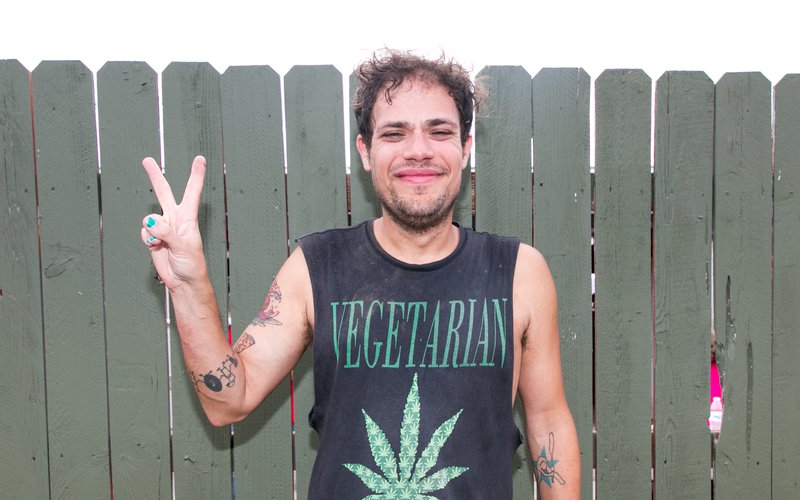
Watching Jeff Rosenstock perform on stage is an easy way to get second-hand exhaustion. He doesn’t so much play guitar and sing as he does punk rock aerobics. He jumps, yells, sweats, and then jumps, yells, and sweats some more. Every moment on stage is a moment he can pull from this unfathomable well of energy he somehow keeps inside his mortal shell. It’s an infectious, life-affirming energy. As he barrelled through his set at Sasquatch! Music Festival, the crowd was ready to match his vitality with one of the brightest, midday mosh pits you’ll ever see.
The former Bomb The Music Industry frontman has been performing punk rock songs since he was 13-years-old covering Green Day with his friends in The Arrogant Sons of Bitches, yet his affection for pumperd up, rapidfire songwriting and performance hasn't waned. If anything, Rosenstock feels more on top of his game than ever. He moves at his own, unrelenting and insane pace. He came steamrolling into 2018 with third solo album, POST-, releasing it on New Year’s Day without any pre-promotion on Polyvinyl Records. But it’s not like it needed it. After a string of buzzworthy live performances on the tour for his previous album Worry. and a batch of fired up, politically charged anthems in tow, 2018 was ripe for Rosenstock to come in with his exciting brand of punk rock fervor.
What’s even more remarkable than Rosenstock’s stamina is his candor and transparency. It’s 2018 and things are… not so great. It’s become routine to question “Is this fascism?” in our daily lives. The world’s getting hotter and we’re just, as Rosenstock sings on “USA,” tired and bored. It’s enough to make you want to give up at times. But Rosenstock’s not having any of that shit. It’s not that he doesn’t feel it too. When we sat down right after his remarkable set at Sasquatch!, he was open about the feelings of hopelessness he’s felt in the past two years and has always been open about his own depression and struggles in his music. With POST-, he’s taking a steadier aim at the powers that be. It’s an album that couldn’t have been more appropriate to kick off the year, like a gunshot kicking off the beginning of a race. But he’s not racing against his musical peers – he’s racing against the looming evils in our collective purview and somehow manages to handle it with a steady blend of cynicism and positive energy (yeah, I know that doesn’t make any sense but it also somehow does when Rosenstock does it). Even when he takes a moment during his set to ask the men in the crowd to keep their hands to themselves and not grope women, he frames it with a simple and effective maxim: “We’re all in this together.”
Talking with Rosenstock, that same brilliant and overwhelming enthusiasm he had on stage doesn’t subside. He talks at a rapid pace, excitedly jumping in on any topic you throw at him. Rosenstock doesn’t claim to have any of the answers and repeats that he is only speaking his personal truths. Still, his perspective feels vital in a world that seems bent on bringing everyone down. Whether it’s tackling fascist ideals or scoring a children’s show, he’s eager to get in the game and let out – again, to quote POST-, “all this useless energy.”
KEXP: That was an amazing set.
Jeff Rosenstock: Thanks so much. It was really fun to play this. It's crazy. We did [Sasquatch], we did Pitchfork. We've done like one or two other smaller ones and like every time I'm just like, "Huh, I wonder if people are going to be there." When people start showing up it was like, "Okay, yeah, cool. This will be fun."
Have the crowds seemed like they've gotten bigger and more engaged as time goes on? It seems like the new record is doing super well.
On this tour? Yeah, it's been getting bigger. It's been exciting. I just kind of... you know, you don't really know why anything's happening. I've been doing this for a long time and have kind of had the same steady situation for awhile that I was really familiar with. Now it's just like, "Oh shit. Something's happening." So I'm just trying not fuck it up. I'm just like, "Alright, cool. Just keep keep doing what you're doing and hopefully it's good. And then when it goes back down, it'll be familiar again." But yeah, it's been a crazy tour off this record.
You've kept up this amazing energy from Bomb The Music Industry through now. Is that important to you to channel that on stage? Hearing you [on stage] talk about just driving up from Portland and then you're up on stage going crazy.
Well, I don't have any other way to play [laughs]. That's just how I play music. It's just what happens. I play guitar in my friend Laura Stevenson's band from time to time and that's quieter, kind of country-ish – just like, you know, classic fucking songs – and I'm playing guitar in it, and I'm just like trying so hard to not just be like [pantomimes shredding his guitar] because I'm like I don't want to look like "drummer at the wrong gig." So with this stuff it's like, yeah, gotta do it. It's just what I want to do. I feel like sometimes my body is like, "Whoa, chill out." But... I don't know, if I'm just standing there I just feel like, "What the fuck am I doing?" [laughs]. I don't know how anybody does that...just stands there. How do you not get antsy and want to jump around?
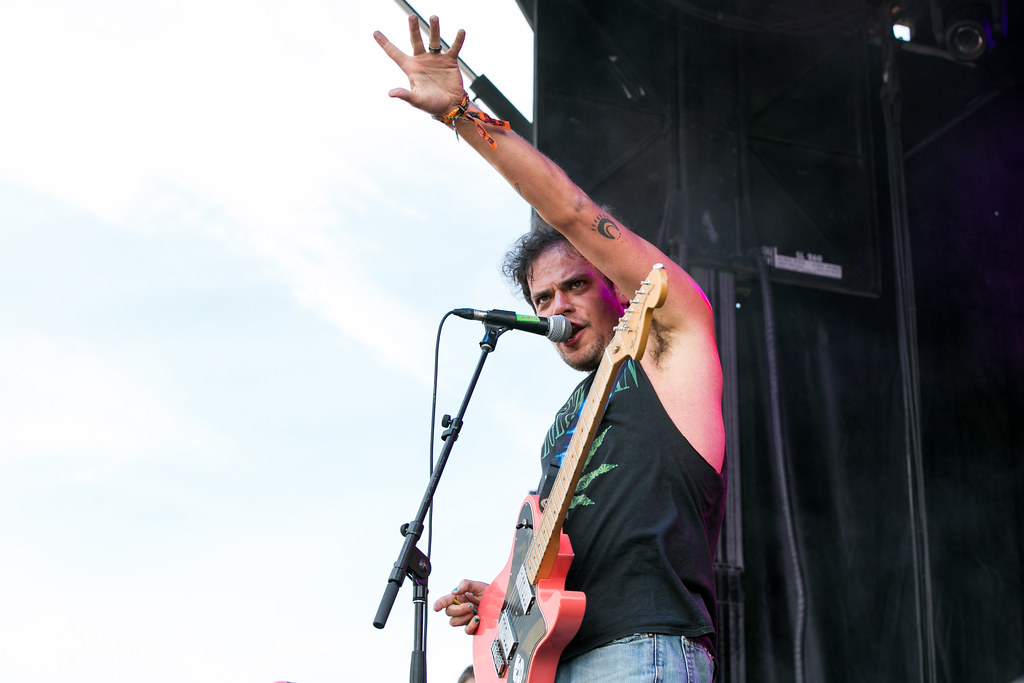
Has it always been that way for you? Since you started playing music?
Yeah, pretty much. I feel like – or hope – that I'm finding better places to like channel that energy and trying to figure out how to make it last for longer during the set so I don't just like... I feel like a classic move that I would do – and I do still do from time to time – is just like the first two songs are like "HYUH HYUH HYUH HYUH!" and then I'm just like, "Oh fuck, I can't sing anymore. I have no voice anymore, and I'm so tired, and I have like thirty-five more minutes to play."
The more that we do it, it's just like it feels natural. The sets have gotten longer and stuff, but we have more spots where you can catch your breath. It's weird. When I get home from tours, at nighttime I've got to run – just run for a while. Just because I have all this pent up energy that I would usually just get out when play it and I'm just sitting around antsy.
The new album Post-, a lot of it has to do with modern anxieties and "everything going on." I read that you wrote a lot of it before Donald Trump was elected in 2016, but it has a lot of relevance to now. Could you tell me how those ideas and themes came together and then kind of extending through what they mean to you now?
I think it mostly has to do with that my schedule has been crazy, and, especially that year, there was not a lot of time to take breaks or anything like that, and I was writing. I don't really stop writing. I feel like if I stop I'm going to fuck it all up. So I just kind of keep writing. Once Worry was done, the world we were living in... just kind of thinking about it a lot while I was writing songs. So, I had time off in January of 2017, and I have a friend who has like a double-wide trailer in the Catskill Mountains – a really nice double-wide trailer. It was plush. It was tight. So I went up with just like all my stuff and I was like, "Alright I'm gonna demo these songs I've just had kind of kicking around my head and see what happens and finally flesh out lyrics." It was right after me and [my spouse] Christine had been in D.C. for the inauguration protests and the women's march. I basically went straight from that up to write.
I feel like lyrics, it's really important for me to write about things that feel potent at the time or else I just have a really hard time thinking what to fucking say. And that was all I was thinking about. I was just like, "Why did this happen? Why can't I do anything to help? What are we going to do? I see how people are reacting on the Internet, and it doesn't seem like it's gonna help. It seems like people are just like tearing each other down instead of going together and like, can you blame them? Everything's fucked." Just a lot of thinking about a lot of things like that. That was kind of the glue that brought everything together. So that's how I ended up writing about that stuff. And then I was honestly pretty surprised that like throughout the year, maybe aside from Downtown Boys, nobody put out a record that seemed to talk about that shit at all. And it was the same thing with Worry, which is weird because I don't consider myself a person who's a political songwriter or anything, but I came up through punk and stuff and that was always a big thing and I just couldn't believe that people were not writing about gentrification or police brutality or all these things...as I was trying to also get out of kind of the cycles that I was in lyrically. I've written a bunch of records at this point. You get in traps and stuff. I was just like, "Well these are all things that are making me feel anxious and terrible. Instead of being inward, they're all, they're all external." So I end up writing about that stuff. I was just always really surprised that I didn't see more people writing about that stuff, and it seems like there is a fair bit of it now. So maybe people just needed time to record their records and shit, or whatever.
I've been reading a lot of commentary, specifically more in the comedy realm, about Trump and how it's kind of a challenge because it's either too obvious a punchline or just too real.
Yeah! Like, it's not funny.
Punk music has a history of protest music. Do you find any similarities between the two? Is it harder to go after someone like this? Someone who is maybe just too obvious?
Yeah, I don't know. No, I don't think so. But I'm not a comedian. Doing that seems hard. But I just think personally, I'm just always trying to write from a place that's emotionally honest. And those are just emotionally honest feelings. Like that feeling of dread and all those bad things and sometimes you laugh to deal with that stuff because it makes it, you know, less insurmountable feeling. It's the same with depression. It's the same way I deal with a lot of things. Try and look at it positively. It's like when you make a joke at a funeral or something like that. And in my mind, I always appreciate that when somebody does because it's not this big scary thing that's completely impossible to even fucking talk about. It's something you could joke about and speak honestly with each other. But also, we're at a time where we're not speaking honestly with each other. We're not speaking openly with each other. We're all talking to each other with this fear of the other side, fear of understanding the other side. Which makes sense because it's fucking mostly evil shit. But how are you supposed to write music? How are you supposed to write jokes? How are you supposed to do anything if you're not even considering the full scope?
It's like you're considering how you feel but not how anybody else feels and just immediately thinking somebody is evil instead of maybe somebody is just stupid or maybe somebody has just been misinformed or maybe somebody has been swindled by the way the fucking big news media companies who show Donald Trump 'round the clock, 'round the clock, 'round the clock, 'round the clock: all of his speeches, all of his shit, saying that he was stupid, but showing all of it before the elections. And just showing Hillary Clinton's emails over and over, which was just a boring, stupid topic that everybody hated. Yeah, they did that because it's fucking effective. Just kind of shutting everybody else out has never been a helpful way to come together and make sure evil shit doesn't happen. And I feel like when it's something like fascism taking over our country, it's important to start... I don't know, it's weird because you're like "I don't want this" but you've got to fucking talk to people and figure out like what the fuck they saw and be like trying to explain it to them on their level sometimes.
So, yeah, it's a heavy topic. I get why people don't do it. It's fucking complicated. People are going to jump down your throat when you say anything. But, I don't know. If people jump down my throat, that's fine. I'll just go back to being less popular and that's fine with me. Communication is everything. We've got to talk to each other.
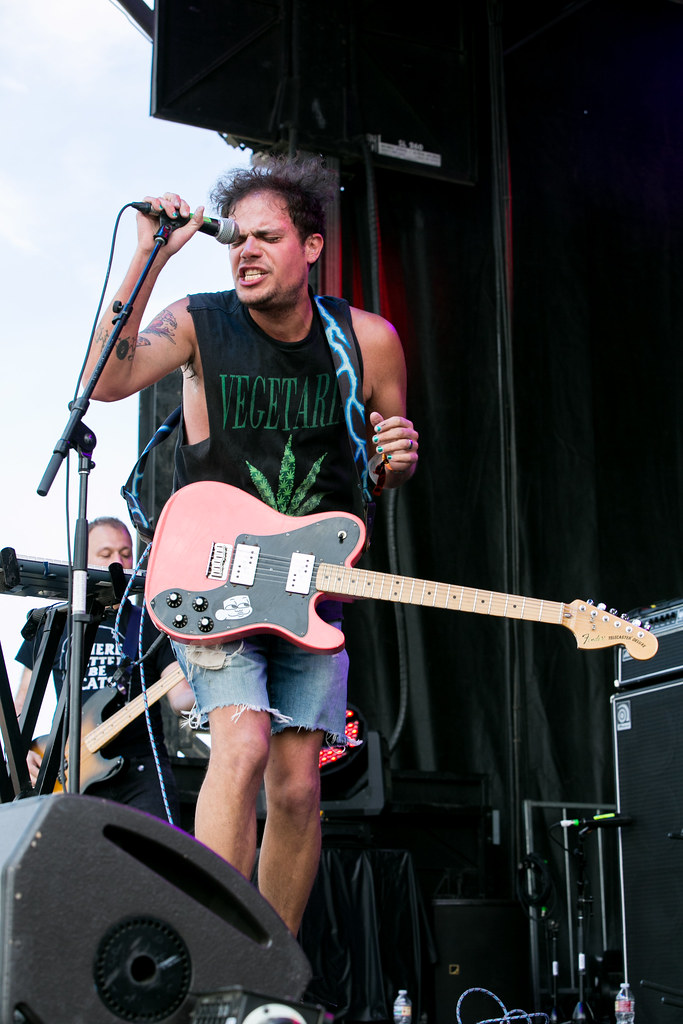
Watching your set earlier, you took some time to really stress the importance of positivity and coming together, which is kind of hard to do sometimes – for all the reasons we've just talked about. Do you think it's an important message that you'd like to spread to people? Do you feel like people should center on finding ways to be positive and come together?
I don't know what anybody else should do. I just know that I didn't anticipate a situation where I'm playing to, give-or-take, a thousand people at a thing, so I feel like if you're talking to a lot of people – especially about sexual assault at festivals and stuff like that – I can't believe I don't hear every band say it. I know we're like the only band who fucking says it sometimes- like us and our buddies. Everybody should say it at everything because then eventually it will get through. And if you don't take the time to do that... even though, like, you'll get some fucking joker on the Internet writing a review that's just like, "Oh, just preachy political whatever."
I don't know. It's important to talk about that, but I also think it's important to not take yourself too seriously when you're talking about that. That's a hard line to walk. I don't know. We mostly don't pull it off, so it's just kind of like we're trying to say something really serious and somehow turn it into something that people will still feel happy to hear, you know. Yeah, I get it. It's tough, but I wish more people took on the challenge.
Totally. I think the way you get there is really productive because sometimes when you get to a serious topic an audience goes, "Oh, buzzkill. I don't want to think about that. I want to have fun."
Yeah, exactly, because you're there for an escape. I get it. It feels like homework or something or you feel like you're being scolded or yelled at when you didn't do anything yet. I get that, and I know that's a thing. I think I always have that in the back of my mind is like, I want the show to still be good. I want our band to keep doing well, so, you know, it's a hard thing. I don't know, whatever. Saying it's hard is stupid. It's all the easiest thing ever to do so like, whatever, but it's certainly a bit of a tenuous way of dealing with it.
The thing I'm always trying to stress is if you see that happening, no one else wants to see that happening either. Just find a bunch of people around you. All of you all get together and be like, "Hey, stop it. We're 10 people and you're one person. Cut the shit." You know? Because I know what it's like to be the one person at a show seeing something like that happening and being like: 'If I try to stop this guy he's going to kick my ass. Yeah, I don't, I don't know. I don't even know what's going on.' And you kind of just look away. But then that's how that shit happens.
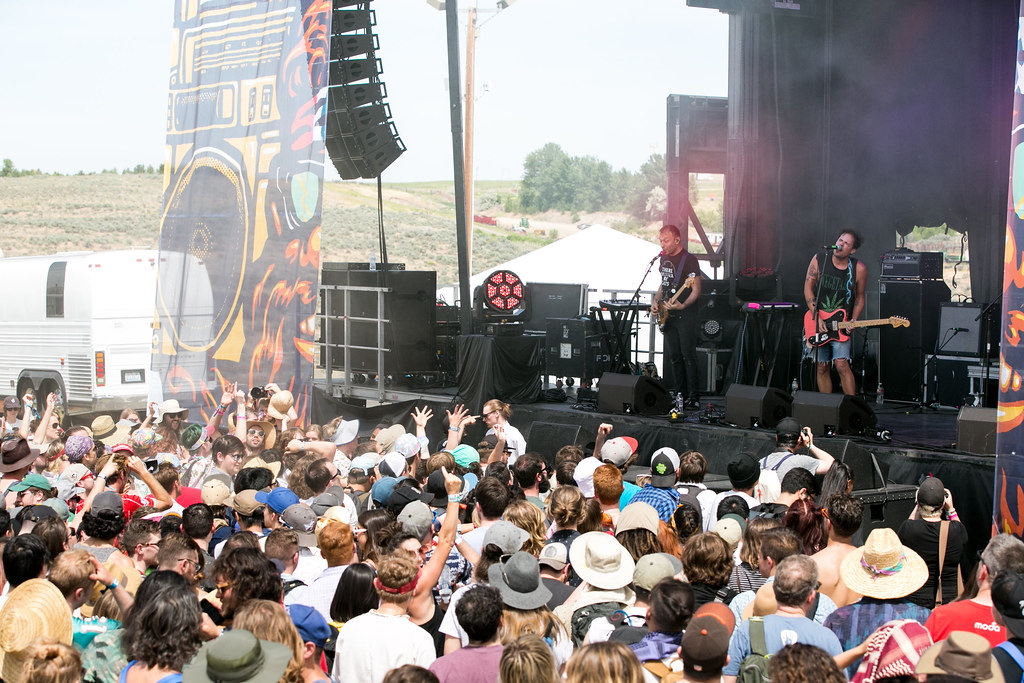
It's been almost six months since the album came out. You've beeen touring these songs and living with these ideas every day to different audiences. Has it shaped how you think about your own songs at all or caused you to change them contextually? I read this quote from you after the election where you talk about how you'd see people while playing tours and think 'Are you the ones that did this?' And now your seeing people across the country every night and playing these songs, which are kind of about that.
Yeah, I think it just feels nice to see it resonate with people because it makes me feel less emotionally alone with it. And I think that that's mutual between people coming to the shows and us is that it says, you know... that's why I say that shit, and that's why we all look out for each other because I feel like we're all in it together. And I think the bigger it gets the more important it is to just try and keep that bond together as much as possible even if the way everything is happening is changing a little bit. So, it's nice. It's nice. It seems like it's staying together just through the music, and it feels good to play new songs and for people to not hate them, basically. It feels good to be like, "This is how I feel today," and have somebody not be like, "Oh, wait, you're an idiot now. Fuck you." Yeah, but as far as lyrically and stuff like that, nah, not really. I'm just trying to just fucking not make mistakes. [laughs].
So you mentioned that you're always working on new stuff. Are you writing on the road right now?
I'm always just kind of like writing in my head and stuff like that. I have a handful of songs. I'm gonna get some time this summer and demo them, and hopefully I'll see if they're good. I think they're good. I don't know. I hope they're good. [laughs].
Would the hope be to keep momentum going and release something soon?
There was going to be an Antarctigo Vespucci record, which is my other band, by the end of this year, but I don't know. I think we have a lot of momentum. I think at this point I'm trying to figure out how to keep my fucking head together because I'm also writing music for a cartoon that's on Cartoon Network right now [Craig of the Creek], which is a full time job. Like, if I was not on tour it would be a full time job, and it's a full time job and I'm on tour. So, it's a lot of stuff. I'm trying to figure out just how to kinda keep up with the pace that I write without putting myself in a situation where I feel like I'm like going to... like, I'm using hyperbole here, but going to fucking kill myself doing it or, just to be honest, get to a point where I'm not having fun doing it because it's just too much to do. So that's just more what I'm thinking about versus keeping the momentum going. I don't think that our audience is stupid. And I think if they like the next record they'll listen to it, and they don't need to get bombarded with it over and over and over again. We all like playing shows enough that we'll play shows here and there. That kind of stuff, but I don't know. At the same time I'm talking about like fuck it. We were just talking at lunch about like, "Yes, yes! Let's maybe make a live record today, and then next summer we'll do this because by that time the third record..." I'm just trying to, you know, stay on top of myself so I don't burn myself out, basically.
Have you found a way to make that possible?
No, not right now. [laughs] Like, the first half of this year was,'Okay, let's see if it works this way,' and it worked in a way. Like putting the record out for free on New Year's was a little bit of, like, an undercut because it was like, okay, I thought it was a good idea. But also I was also like, maybe people won't hear it, and it will kind of fly under the radar. We'll play these shows, and it'll be real chill, and I won't have to do any press, and I'll have that time to work on the show. It'll be kinda like a slow burn. Kinda like Beck with Mutations or Kendrick Lamar untitled unmastered. Like just one where it's like, it's in there and then you go back and you're like, 'Oh that shit was actually good.' You know. And so I was like, 'Okay, so it's like 50/50 whether it'll work out that way or the other way.' And it worked out a way I didn't expect it to. I don't know. I didn't expect the shows to start getting this nuts. It's cool. It's a cool thing. But, yeah, it's always adjustment when you're just trying to keep a good head on your shoulders and stay normal and try to be nice to people you're around instead of being grumpy and cranky all the time.
Does the way you released and rolled out POST- make you change your perception of how you want to release records in the future? You've always been pretty progressive in that regard.
The way we put out POST- is the way Bomb the Music Industry put out Adults. It's the way, basically, Antarctigo Vespucci put out Leavin' La Vida Loca. It's the way I did the first three Bomb records. I've always liked doing that and basically, when we signed with Side One [Dummy Records] we had a two album deal. I already had it in my head I was like, 'Okay, the third record fucking put out on Quote Unquote [Records].' And maybe that's it. Just, maybe that would be a cool thing, and then as time went on I was like, 'Yeah, that would be cool.' I don't want to lose track of all the stuff that felt important to me that made me want to do this in the first place.
How did doing the score for Cartoon Network’s Craig of the Creek come about, and how do you go about creating a tone for an entire series?
Well, it came about because this dude, Ben, saw Bomb the Music Industry playing a backyard in show in 2007 and started liking our band. And then he ended up writing for Steven Universe and then getting his own show and emailing me about doing the music. And I was like, "Yes! Yes, yes, yes." It's crazy. It's making more sense now, but I feel like I'm always wrapping my head around it. I think there are certain things that I'm just trying to do. Like, I wanted to make it really guitar and analog synth based. I feel like a lot of the cartoon music that I see feels like it's made in the box. Do you know that term means? Like, it just feels like it's been made on a computer, and even though I'm obviously making it on a computer, I wanted it to not feel like it was made on a computer.
So you have something like that in there and then me and one of the creators, Ben, talk about it. We're like, “Okay, this episode should feel like Princess Mononoke. Well, okay, how can I give this vibe with just what I have?” I'm just kind of always building vocabulary for everybody and building motifs and melodies for everybody and then as time goes on you have all these colors to paint with. I just try to avoid traps and stereotypes with it. Like, there's a kid on the show who is kind of the older kid, and at first if you watch it you're like, 'Oh, this kid's kind of dumb,' but he's just really funny, and he's the older kid. He's a little slow with some stuff, but it's kind of like I don't want it to feel like any of the music is making fun of the characters or doing something we already know about the characters. So, like to me, a melodica kind of made sense. And just kinda like having dreamy, like whammy, spacey guitars because he felt more to me like he's just a space cadet, and also he's really funny and fucks stuff up sometimes. So it's things like that where you're just kind of like, okay, well, what does it seem like this kid is listening to on his Discman in 1996 while he's playing out at the creek? It's all just kind of that stuff and then getting to play metal guitar really often is just really fun.
it's very episode to episode different. And also, I don't know if that's good or bad. I feel like it will be smart for me to just figure out how to do it faster and not try to make every episode like the score to a movie. But I really like doing it. So it's just kind of like, I want to make it good. So it's kind of tough. I don't know. It's not kind of tough. It's just really fun. It's fun [laughs]. I have a really fun time doin' it.
Are you a pretty big fan of animation? Your latest video for "9/10" is also animated. Is it something you've been passionate about?
I mean, saying I'm passionate about it would make people who are actually passionate about animation ask me a bunch of questions I don't know answers to. But, like, especially the crew who works on The Creek, and I was a big Adventure Time fan. I really like Steven Universe. I like Bob's Burgers a lot. I like The Simpsons a lot. I've started reading a bit of Manga stuff but not enough that... I don't know. I do like animation though. I think it's about grownin' up with The Simpsons and just having that be the thing that was there for me, and also, coming home after school watching Disney Afternoon or like Tiny Toons or Animaniacs and that kind of stuff. It's just always lodged in there, and I've always liked cartoons. To write music for a cartoon is just literally like a dream. When I was a kid and when I was growing up and going to school, learning music and doing all this shit. When I was starting to write music it was like, it would be so cool if I could do that someday. So yeah, it's really fun to be able to do it. I'm stoked on it.
Are you hoping to do more score work?
Oh yeah. I have no idea how to make it happen, but that would be so awesome. It's great. It's like, for me it's fun to just write music that seems like someone else is in charge of emotionally guiding it. You don't have to look at anybody. You don't have to write lyrics. You just gotta go on there and make it sound like what the characters are feeling, you know, and that's really, really fun. I have a really fun time doing that. It's really freeing.
It's an interesting contrast between your solo music or your other bands, where you're conveying something that's inside of you. Is that kind of freeing?
It's awesome. It's both. Both things are freeing. When I started writing music for Craig of the Creek I kind of thought like, “All right, shit. I'm going to have a hard time writing records from here on out,” but it is kind of the opposite where songs are just coming when I'm done. It's almost like that part of my brain is like, “Okay, it's song time. Write a song for you right now.” And then when I'm on tour and when I come back and have a pile of work to do, I'm always like, “Oh shit. All right. Let's get into these shreddy guitars and these marimbas and synths and stuff and you know, make something fun.” It's super fun. I'm lucky to have that job.
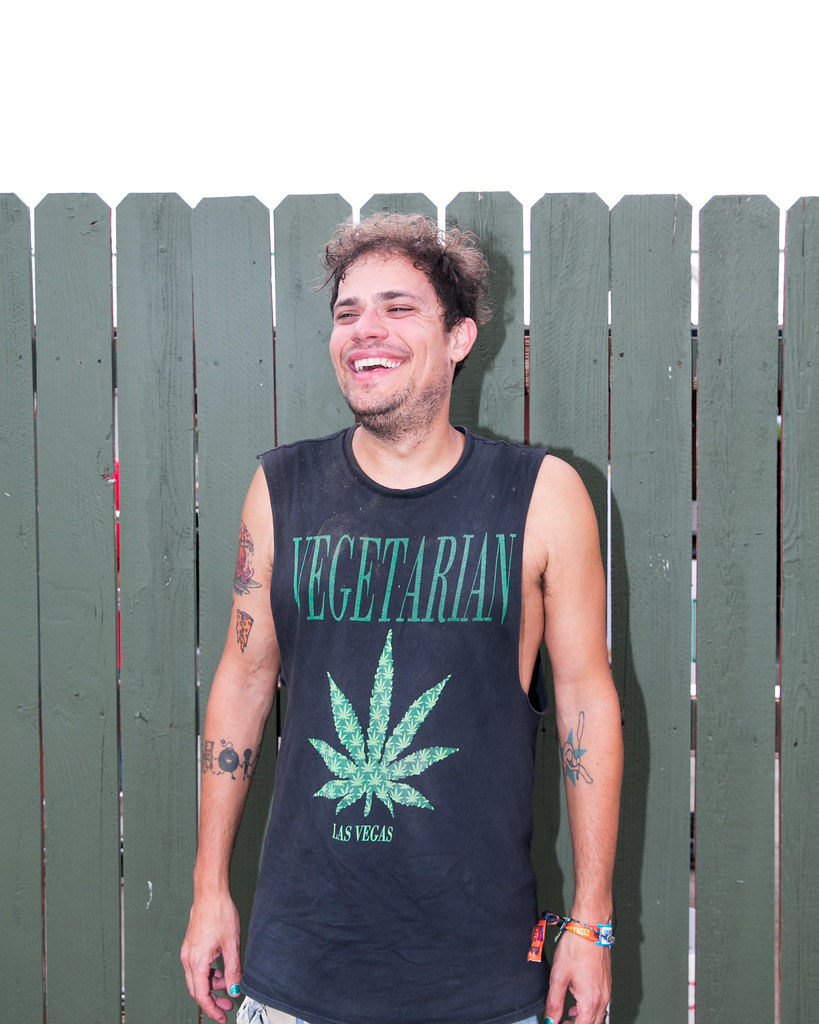
David Bazan discusses taking up his old moniker once again, the next five Pedro albums, and utilizing his platform to bring attention to white male privilege and abuse against women.
Since 2002, Seattle's Light in the Attic Records have been reissuing unknown, under-appreciated, and utterly fantastic music. KEXP chats with founder Matt Sullivan about the label's releases, past and present.
From the ashes of Bauhaus, Love and Rockets, and Tones on Tail comes Poptone, a new project from Daniel Ash, Kevin Haskins and Diva Dompé (Haskins' daughter).